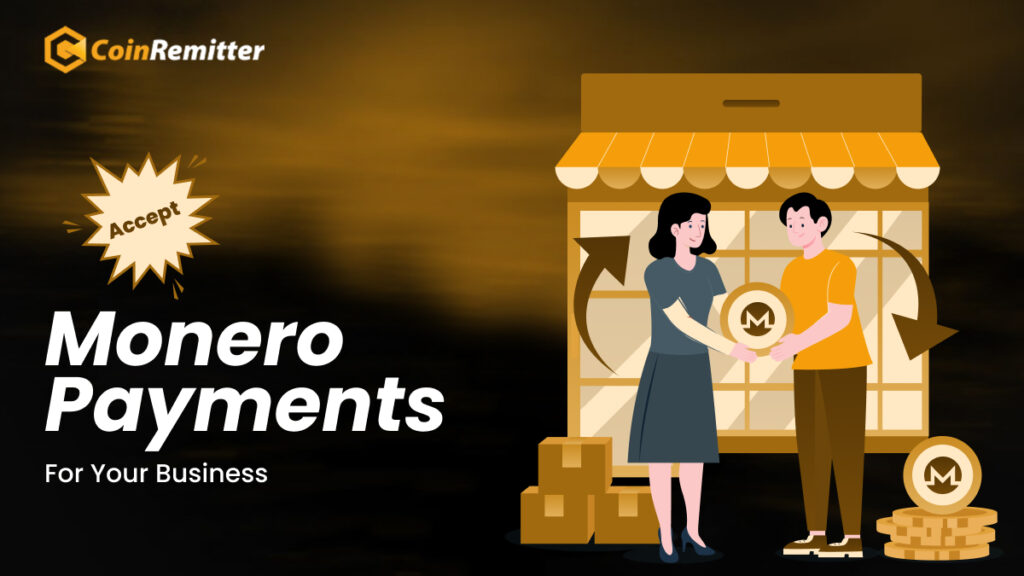What is Monero?

Monero was launched in 2014 with the purpose of prioritizing privacy. The key reason for introducing Monero was to provide secure, private, and untraceable transactions. The following technologies help Monero achieve robust privacy:
Ring Signatures: This feature helps the blockchain obfuscate the source of a transaction by combining a user’s transaction with other multiple users.
Stealth Addresses: This feature creates a one-time wallet address to prevent observers from linking the sender and receiver by generating a new address for each transaction.
RingCT: Ring Confidential Transactions uses cryptographic techniques to hide the transaction amount.
Accept Monero Payments For Your Business

On Coinremitter, merchants can accept Monero payments by using the following methods:
- Accept Monero payments using Coinremitter’s crypto plugins
- Accept Monero payments using Coinremitter’s crypto payment API
Method 1: Accept Monero Payments Using Coinremitter’s Crypto Plugins
Coinremitter provides merchants with plugins for several popular open-source platforms. They are Magento 2, WordPress (WooCommerce), OpenCart, PrestaShop, Laravel, PHP, and Node.js. These plugins can be installed whether from the respective marketplaces or from GitHub (based on availability).
You can know more about Coinremitter’s crypto plugins by visiting the official website. You can find a complete guide to installing the plugin by clicking the icon of the respective one. For example, you can know the process for installing Coinremitter’s WordPress plugin by clicking the respective icon itself.
Further steps include activating the plugin after installing it and adding a Monero wallet (only compatible with Coinremitter). Then select ‘Monero’ from the available options (cryptocurrencies). Then get the API key and password of the Monero wallet in which you’re willing to receive XMR payments.
Then set up some mandatory fields like exchange rate multiplier and minimum invoice value. Merchants can also add multiple Monero wallets here. But the maximum limit for creating a wallet is set to 5 (per account per cryptocurrency). Now your customers can make Monero payments via an auto-generated invoice after selecting an option of crypto payments.
Method 2: Accept Monero payments using Coinremitter’s crypto payment API
Coinremitter has got crypto payment APIs for merchants if your website isn’t compatible with Coinremitter’s plugins. However, integrating the XMR API is a bit complex, but a good developer can get the job done. Merchants need to integrate multiple APIs in order to optimize the flow of accepting Monero payments on their websites.
- Create a New Wallet Address (mandatory): By integrating this API, Coinremitter will automatically generate a wallet address when required. Integrating this is mandatory as having a Monero wallet is necessary for receiving XMR payments.
- Validate Address: This API allows merchants to check the validity and compatibility of the wallet address added by the customer for making the payment.
- Withdraw (mandatory): As Coinremitter doesn’t need any bank account to withdraw funds, integrating this mandatory API will allow you to transfer funds to an external Monero wallet from Coinremitter’s Monero wallet.
- Get transaction: Merchants can receive payments using the transaction ID added by themselves in the webhook by integrating this API.
- Get Transaction by Address: Merchants can receive payments to the Monero wallet address added by themselves in the webhook by integrating this API.
- Get Wallet Balance: Merchants can view their XMR wallet balance on their website if they integrate this API.
- Create an Invoice (mandatory): This API lets your website automatically generate an invoice whenever a customer requests to pay in Monero.
- Get the Invoice: This API helps merchants get the details of the auto-generated invoices along with their payment statuses.
- Deposit/Withdraw Response: With the help of this API, Coinremitter will notify merchants via a webhook whenever any transaction takes place.
- Notify Invoice Response: After integrating this API, merchants can get notified on the ‘notify URL’ whenever an invoice gets generated.
- Get Fiat to Crypto Rate: Merchants can display the exchange rate of cryptocurrencies in fiat currencies on their websites.
- Get Coin USD Price: Merchants can display the exchange rate of the supported currencies of Coinremitter on their websites with the help of this API.
Why Choose Coinremitter for Accepting Monero Payments?
There are several reasons for prioritizing Coinremitter for Monero payments. Let’s have a look at them in brief:
Low Crypto Fees: Fees on crypto transactions and processing fees on withdrawals charged by Coinremitter are comparatively lower than most of the other crypto payment gateways.
Express Support: The support staff at Coinremitter is dedicated to helping you with reliable solutions whenever required.
Security: Coionremitter possesses robust crypto security features that keep your Coinremitter account safe from unauthorized logins.
No KYC, No Bank Account: You can start accepting crypto payments using Coinremitter without going through the formalities like KYC and adding a bank account.
Summary
In short, your decision to integrate the Monero payment gateway (especially Coinremitter) would help your business expand exponentially. As a retailer, it is now easy to embrace cryptocurrencies as a payment option with the use of coinremitter the crypto payment gateway. You can easily install it on your website and start accepting cryptocurrencies as a payment method.
